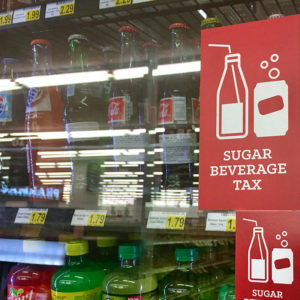The D.C. City Council is considering implementing taxes on sweetened beverages, despite evidence the tactic to fight obesity and diabetes hasn’t worked in other cities that have passed these taxes.
Council members are considering implementing a 1.5-cent-per-ounce tax on sugary drinks, which would increase the cost of a two-liter bottle of soda by a buck. The Washington Post points out this would be one of the highest such taxes in the country.
“On average, children consume 30 gallons of sugary drinks a year. That’s a bathtub full. It’s a huge health risk,” said the bill’s author, council member Brianne K. Nadeau.
Any drink with added sugar would be included in the tax, including orange juice and sweetened iced coffee.
D.C.’s tax would be higher than what has been implemented in four California cities. Albany, Berkeley, Oakland and San Francisco have all implemented soda taxes of 1 cent per ounce. The D.C. tax would match that of Philadelphia and be less than what has been put into place in Seattle (1.75 cents per ounce) and Boulder (2 cents per ounce). These taxes are imposed on distributors, who pass on the tax to consumers in the form of higher prices.
D.C. wants to use the revenue from the tax to spend on wellness programs in areas of the city with the highest rates of obesity, believing the combination of such programs combined with a tax to dissuade residents from buying sugary drinks will combat the problem.
But studies have shown such “nanny state” taxes are largely ineffective.
Guy Bentley, director of consumer freedom at the Reason Foundation, cites an examination by the New Zealand Institute for Economic Research that looked at 47 studies on soda taxes around the world and found no “evidence that any sugar tax actually implemented anywhere in the world has led to improvements in health.”
A study by McKinsey & Company found that soda taxes were largely ineffective at combating obesity and that “existing evidence indicates that no single intervention is likely to have a significant overall impact.”
Bentley writes that advocates tend to count any drop in soda sales as a victory, “no matter how small or regressive or whether it achieved any positive health benefits.”
“The desire to raise revenue for public programs is no crime,” he wrote. “But it shouldn’t be masked under the guise of public health.”
The Urban-Brookings Tax Policy Center argues that if cities really were focused on improving public health by reducing sugar consumption, they’d be better off taxing beverages by sugar content rather than volume.
As it is, the current system works better if the government’s primary goal is raising tax revenue. Philadelphia’s tax is one of those, pitched as a way to fund education programs rather than improving health outcomes, and generates about 2 percent of the city’s overall tax revenue.
Like other lifestyle taxes, this presents a paradox for cities. If they want to raise money for other programs with this newly-found revenue, do they actually want more consumption to feed the coffers? Or, if they are trying to discourage consumption than they want less money.
Although Philadelphia leaders still tout the tax as successful in reducing sugary drink consumption, a Stanford Business School study found that people cross-shopping outside city borders to avoid the duty reduced the stated net decrease in sales. The study also found that an increase in purchases of untaxed drinks like milk kept caloric intake rather high.
Furthermore, Stanford discovered that the richest households saw the biggest drop in consumption of sugary drinks. Impoverished families who are more likely to be obese found it more difficult to avoid the tax.
Anna Tuchman, a researcher at Northwestern University, found that sales of sugary drinks dropped by just 20 percent in Philadelphia rather than the stated 46 percent when cross-shopping was factored in.
Philadelphia expected to raise $92 million from the tax in its first year, but only realized $79 million in revenues, she found.
“People are able to maintain their sugar and calorie intake, and the city is falling short in their ability to raise tax revenues,” Tuchman told NPR.
The soda tax could also oddly drive people to drink alcohol. The Tax Foundation reported in 2017, not long after Philadelphia’s tax was implemented, that a 12-pack of Propel energy drink cost $10.04 in one store at full price, while a 12-pack of Icehouse beer was just $7.99 due to the lower tax on suds.
Thankfully, there has been some pushback. Cook County in Illinois, home of Chicago, implemented a soda tax in November 2016 before repealing it less than a year later. This despite former New York Mayor Michael Bloomberg pouring millions into a fight to defend the tax, Politico reported. The billionaire has fought for soda taxes around the country, including in Philadelphia and Oakland, after his sugary tax policy failed in New York.
Arizona and Michigan preemptively blocked local governments from enacting soda taxes, while California and Washington now have laws on the books preventing more cities from passing the taxes.
“We are definitely solidly behind preemption efforts because this is a very damaging tax to consumers, working families and small businesses,” American Beverage Association spokesman William Dermody told Politico.
The D.C. Council should heed the studies and the actions of more forward-thinking governments and say no to the proposed soda tax.

